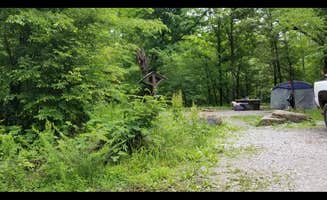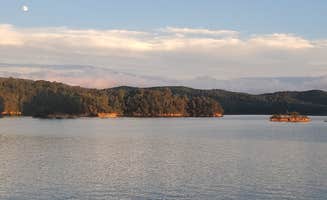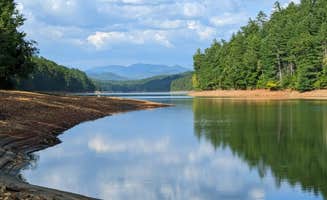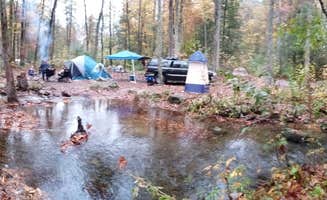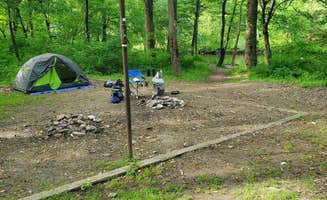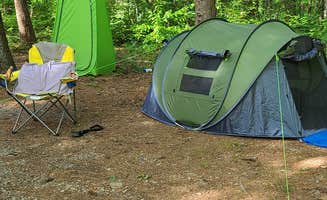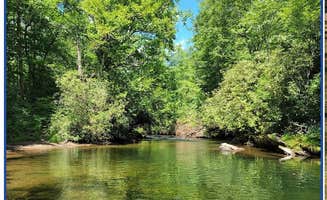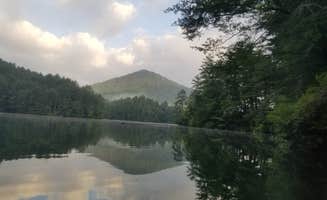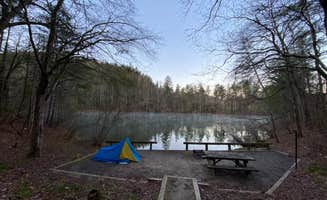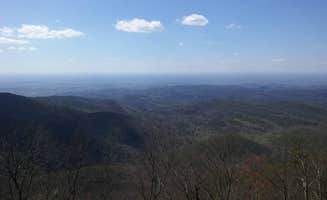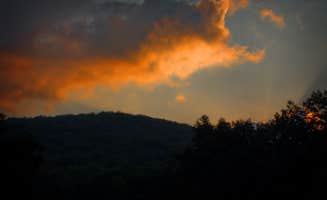Primitive camping near Farner, Tennessee features rustic sites situated at elevations between 1,500-2,000 feet in the Cherokee National Forest. The region receives approximately 55 inches of annual rainfall, creating a lush environment with numerous creek-fed camping opportunities. Fall temperatures average 45-65°F, making it an ideal season for backcountry exploration while summer months typically see highs in the mid-80s with higher humidity.
What to do
Fishing opportunities: Lost Creek Campground provides creek access for anglers seeking smaller mountain fish. "The creek can be used for shallow water wading or fishing," notes one visitor who explored the area in January when the campground was completely empty.
Hiking on Benton McKaye trail: The trail runs directly beside Lost Creek Campground, offering day hiking opportunities from your campsite. "The Benton McKaye trail running directly beside it," reports one camper, highlighting the accessibility of established hiking routes from this free dispersed camping area.
Water recreation: Long Hungry Road Dispersed Campsites offers lakeside access for paddling enthusiasts. "Each has a picnic table, fire pit/grill, and level area for 1-2 tents, and lake views (most have lake access if you want to put in a kayak or canoe)," mentions one reviewer who appreciated the site layout.
Mountain biking exploration: The forest service roads around primitive camping areas provide mountain biking routes. "I've ridden a bike through here several times over the years... Many places to explore on bike or hiking," shares a camper who visited the Lost Creek area.
What campers like
Creek-side camping: Sourwood Campground receives high marks for its riverside setting. "The closeness to the river is the main attraction here. It's ever-present sounds make it easy to forget everything," writes one reviewer who valued the natural soundscape.
Privacy between sites: Dispersed camping areas provide separation between campers. "Sites are so spread out it feels like you're the only one on the lake!" reports a visitor to Long Hungry Road Dispersed Campsites who appreciated the secluded feeling despite other campers being present.
Wildlife viewing: Panther Top Dispersed Site offers opportunities to observe local aquatic wildlife. "Lots of fish jumping and I caught a 1 pound large mouth bass on a silver spinning lure," notes one camper who enjoyed fishing during their stay at this lake-adjacent location.
Night sounds: The natural symphony at many sites creates a peaceful camping experience. "All you hear is the river at night," describes a visitor to Lost Creek, highlighting the calming effects of flowing water during overnight stays.
What you should know
Road conditions vary widely: Some primitive camping sites require significant off-road driving skills. "It takes about 35 minutes to go 4 miles. Ground clearance and off-road tires needed," warns a camper about Rough Creek Dispersed camping area, emphasizing the challenging access.
Site availability is competitive: Popular dispersed camping areas fill quickly, especially on weekends. "Find a spot early," advises a Sourwood Campground visitor, while another notes, "We showed up late after 1pm. I was afraid that we were out of luck."
Limited facilities: Most primitive camping near Farner contains minimal infrastructure. "No generators, water, or porta potties. How camping in the forest should be!" explains a Lost Creek Campground user, emphasizing the truly primitive experience.
Trash issues: Some areas suffer from improper waste disposal. "The only complaints are having to spend an hour picking up others trash that they left," reports a camper at Sourwood Campground who helped clean the area.
Tips for camping with families
Creek exploration for children: Jack's River Falls Trail offers engaging water features for families. "This is a tough trail but good for teens looking to challenge themselves in the back country. The views are amazing with rock falls," suggests a parent who brought children to the area.
Multiple tent capacity: Some sites accommodate larger family groups comfortably. "We had a group of 10 that spread out over this little 'island' very easily. There were two campfire areas already in place and most sites very level and well covered by trees," describes a Jack's River Falls visitor who camped with family.
Water proximity considerations: Sites with direct water access require additional supervision. "The dogs loved it because our site was right on the lake," mentions a camper at Long Hungry Road, highlighting both the appeal and potential safety considerations for families with children or pets.
Elevation changes: Many campsites require navigating terrain changes from parking areas. "Every site has steps down to the level area (L9 has the longest straight down hill to the lake), so you won't be parking right next to the site," notes a visitor, important information for families carrying gear.
Tips from RVers
Size limitations: Goforth Creek Campground and most primitive sites in the area aren't suitable for larger RVs. "Parking lot is very small so be on the lookout for it. Must hike in!!!" warns a visitor, indicating this area is not RV-compatible.
Leveling challenges: Smaller vehicles like truck campers or campervans may manage at certain sites with preparation. "I had to find a few rocks to level my truck so the rooftop tent was level," explains a camper at Panther Top Dispersed Site, relevant for those with truck campers or small trailers.
Turn-around spaces: Road endings can present difficulties for larger vehicles. "It would absolutely NOT be a good location for a class A motorhome but maybe some of the smaller class C's could get settled in there," advises a Sourwood Campground visitor who observed the tight quarters.
Overnight parking options: Some campers use roadside pullouts when actual sites aren't accessible. "We camped in a RTT on the pulloff across from the site, saw a few other vans doing the same," shares a visitor to Long Hungry Road who adapted to the limitations for vehicle-based camping.


